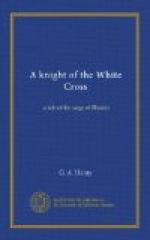“Do not be despondent, love,” he said to his weeping wife, as he bade her goodbye. “Everything is in our favour, and there is a good hope of a happy termination to this long struggle. But, win or lose, be assured it is the last time I will draw my sword. I have proved my fidelity to the House of Lancaster; I have risked life and fortune in their cause; but I feel that I have done my share and more, and whichever way Providence may now decide the issue of the struggle, I will accept it. If we lose, and I come scatheless through the fight, I will ride hither, and we will embark at Plymouth for France, and there live quietly until the time comes when Edward may feel himself seated with sufficient firmness on the throne to forgive past offences and to grant an amnesty to all who have fought against him. In any other case, dear, you know my wishes, and I bid you carry them out within twenty-four hours of your receiving news of a defeat, without waiting longer for my appearance.”
As soon as it was light, Edward advanced to the attack. The Duke of Gloucester was in command of the vanguard. He himself led the centre, while the rear was commanded by the Marquis of Dorset and Lord Hastings. The most advanced division of Lancastrians was commanded by the Duke of Somerset and his brother. The Grand Prior of the Order of St. John and Lord Wenlock were stationed in the centre, the Earl of Devon with the reserve. Refreshed by their rest, the queen’s troops were in good spirits. While awaiting the attack, she and the prince rode among the ranks, encouraging the men with fiery speeches, and promising large rewards to all in case of victory.
Gloucester made his advance with great difficulty. The obstacles to his progress were so many and serious that his division was brought to a halt before it came into contact with the defenders. He therefore brought up his artillery and opened a heavy cannonade upon Somerset’s position, supporting his guns with flights of arrows, and inflicting such heavy loss upon him that the duke felt compelled to take the offensive.
Having foreseen that he might be obliged to do so, he had, early in the morning, carefully examined the ground in front of him, and had found some lanes by which he could make a flank attack on the enemy. Moving his force down these lanes, where the trees and hedges completely hid his advance from the Yorkists, he fell suddenly upon Edward’s centre, which, taken by surprise at the unexpected attack, was driven in confusion up the hill behind it. Somerset was quick to take advantage of his success, and wheeling his men round fell upon the Duke of Gloucester’s division, and was equally successful in his attack upon it. Had the centre, under Lord Wenlock, moved forward at once to his support, the victory would have been assured; but Wenlock lay inactive, and Somerset was now engaged in conflict with the whole of Edward’s force. But even under these circumstances he still gained ground, when suddenly the whole aspect of the battle was changed.




